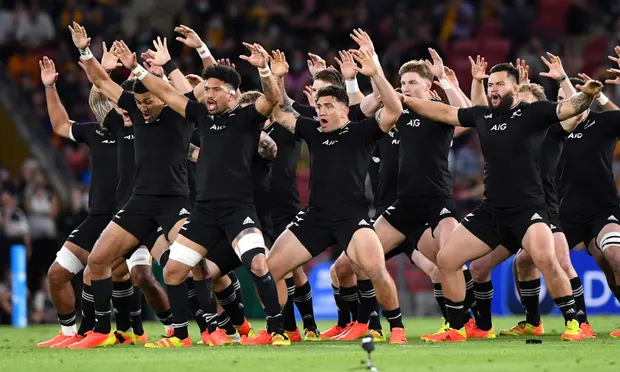Cap the Haka? Research and rugby face off over All Blacks’ war dance
Cap the Haka? Research and rugby face off over All Blacks’ war dance. Should rugby do away with the Haka? Let’s try an alternative, less divisive inquiry.
Should there be restrictions on when and where teams can perform the New Zealand Haka and similar chants before kickoff?
Some have said what would happen if the New Zealand Haka and chants like the Fijian Cibi and the Tonga Sipi Tau gave an unfair advantage to those teams who did so.
The University of Queensland’s School of Human Movement published research this year showing that players who performed these war dances experienced higher heart rates in the seconds before the start of the match.
If you’re fighting an opponent standing still in the cold, your squats and lunges are akin to a warm-up. Although these improvements may seem minor, they may prove decisive in the early stages of a game at the highest levels of competition.
Statements
Victor Matfield, a former Springbok lock who faced a Pacific Island war dance before 34 of his 127 Tests, says, “To be honest, even if it did provide them a competitive advantage – and I’m not so sure if it does or not – I would hate to see it go.”
Especially when we played the All Blacks, I had a blast. For me, it was a boost, so if it helped them, great. Something to perk up one’s thoughts.
I anticipated a battle, knowing that it would serve to motivate me. I would look across the field at my opponent in such a situation and gladly accept the challenge. Amazing development for our sport.”
But, and this is important, I do agree with Matfield. This Haka thing is awesome.
When Springbok Kobus Wiese squared off against All Blacks legend Jonah Lomu in the 1995 World Cup final, I learned of it for the first time.
On the All Blacks Podcast, New Zealand Rugby’s Maori cultural advisor, Luke Crawford, explained that the Haka’s origins are spiritual. He has my trust.
Even now, when I see the Haka performed live, I am struck with the same holy cold I felt when those giants first joined together.
An electrifying rallying call from the captain, the low rumble of a squad working together, tremendous knee slaps, and hulking forearms pushed forth like spears and shields. A person’s breath is taken away by it.
I think any fan will never forget their first time seeing it for themselves, Matfield says. That’s a one-of-a-kind thing. Many anticipate it with excitement.
Declarations
You’re about to see one of the best teams in the world because, yes, it’s the All Blacks. While All Blacks games are always special, the Haka is one more thing that sets them apart.
The World Cup final, though… what then? What if your squad is the one to fall short by a single point? A war dance from the other team or seeing your captain hoist the Webb Ellis Cup?
Fans from every country have held grudges for decades over calls that were never made, such as a forward pass or a mishandled kick. Surely everything leading up to the referee’s beginning whistle counts if a rugby game is just a series of fleeting moments.
Don’t believe me? Just ask any All Blacks supporter about Suzie the waiter.
“It’s not about the opposition, though; it’s about us,” says Sean Fitzpatrick, the former New Zealand captain who led the first All Blacks team to perform the Haka in their home stadium during the first World Cup in 1987. That jersey has never been a source of inspiration for me. I don’t think what you do is disrespectful if you face it head-on.
Because it has to do with us, our ancestry, and our Whakapapa. Regarding those who have gone before us. It’s more than just a challenge that we’re issuing. Perhaps the extent to which it runs is not fully appreciated by the public.
Australia responded last week with a culturally significant challenge of their own. James Slipper’s squad formed a boomerang while the All Blacks haka.
Even though the Wallaby skipper insisted that his team did what they could to show respect for Australia’s Indigenous population, not everyone saw things that way.
Australia’s New Zealand-born coach, Dave Rennie, said, “Rieko Ioane had a lot to say to our lads after the final try, mouthing off at Folau Fainga’a around disrespecting the haka.” We just assume the boomerang position and charge ahead to counteract the lack of a haka. They have issued a challenge, which we will gladly accept.
Uncouple
They throw a challenge at us, and we’re supposed to stand there and do nothing? Simply accept it? Not going to have anything to do with stopping that.
This pre-game ritual’s cultural significance and sensitivity must be considered in any reform discussion. It would be extremely difficult, as Crawford put it, to “uncouple” the haka from rugby at this point. That doesn’t stop us from questioning established norms.
Maybe the answer is to make it such that nobody, not even the All Blacks, may do the Haka in public save in their own homes.
Why should they be allowed to play with this advantage at Twickenham, Ellis Park, or Suncorp? Is it right that the All Blacks get the last word before the flyhalf starts the game? When traveling, they might do the Haka in place of the national anthems.
Matfield shrugs aside the inquiries. You should “go about and ask South African rugby supporters what they feel about the Haka and if they want to see it go,” he says. From what I can tell, they won’t.
In fact, why should they? It’s one of the best parts of playing our game. Who would want to take that away, anyway?

